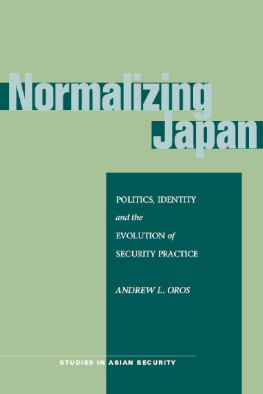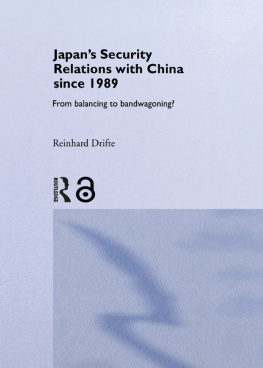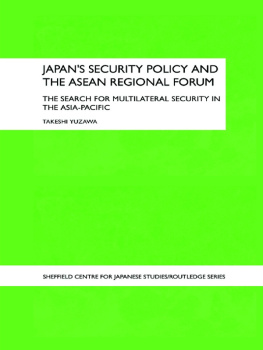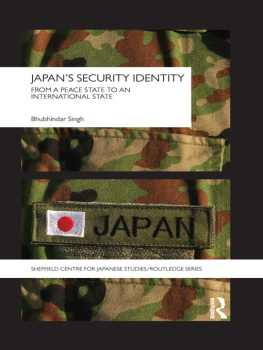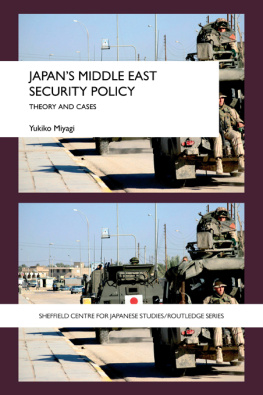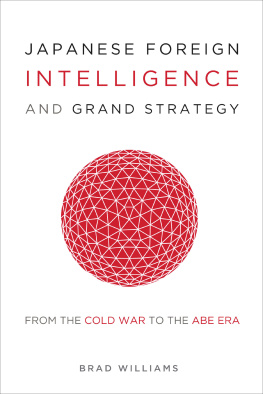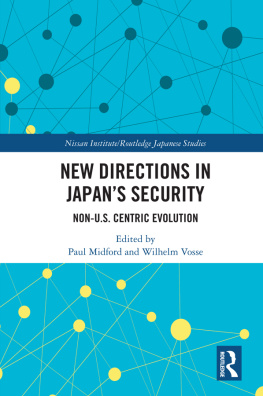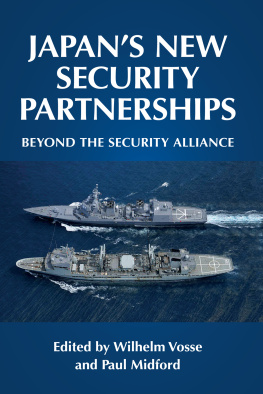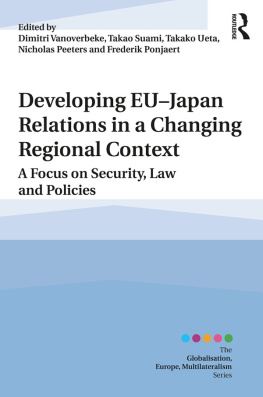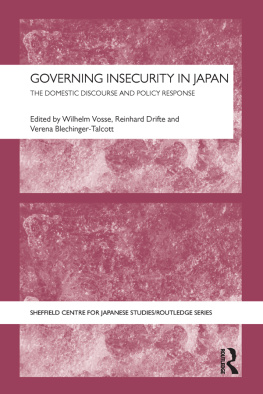Japans Security Renaissance
Contemporary Asia in the World
Contemporary Asia in the World
David C. Kang and Victor D. Cha, Editors
This series aims to address a gap in the public-policy and scholarly discussion of Asia. It seeks to promote books and studies that are on the cutting edge of their disciplines or promote multidisciplinary or interdisciplinary research but are also accessible to a wider readership. The editors seek to showcase the best scholarly and public-policy arguments on Asia from any field, including politics, history, economics, and cultural studies.
Beyond the Final Score: The Politics of Sport in Asia, Victor D. Cha, 2008
The Power of the Internet in China: Citizen Activism Online, Guobin Yang, 2009
China and India: Prospects for Peace, Jonathan Holslag, 2010
India, Pakistan, and the Bomb: Debating Nuclear Stability in South Asia, umit Ganguly and S. Paul Kapur, 2010
Living with the Dragon: How the American Public Views the Rise of China, Benjamin I. Page and Tao Xie, 2010
East Asia Before the West: Five Centuries of Trade and Tribute, David C. Kang, 2010
Harmony and War: Confucian Culture and Chinese Power Politics, Yuan-kang Wang, 2011
Strong Society, Smart State: The Rise of Public Opinion in Chinas Japan Policy, James Reilly, 2012
Asias Space Race: National Motivations, Regional Rivalries, and International Risks, James Clay Moltz, 2012
Never Forget National Humiliation: Historical Memory in Chinese Politics and Foreign Relations, Zheng Wang, 2012
Green Innovation in China: Chinas Wind Power Industry and the Global Transition to a Low-Carbon Economy, Joanna I. Lewis, 2013
The Great Kant Earthquake and the Chimera of National Reconstruction in Japan, J. Charles Schencking, 2013
Security and Profit in Chinas Energy Policy: Hedging Against Risk, ystein Tunsj, 2013
Return of the Dragon: Rising China and Regional Security, Denny Roy, 2013
Contemporary Japanese Politics: Institutional Changes and Power Shifts, Tomohito Shinoda, 2013
Contentious Activism and Inter-Korean Relations, Danielle L. Chubb, 2014
Dams and Development in China: The Moral Economy of Water and Power, Bryan Tilt, 2014
Marching Through Suffering: Loss and Survival in North Korea, Sandra Fahy, 2015
The JapanSouth Korea Identity Clash: East Asian Security and the United States, Brad Glosserman and Scott A. Snyder, 2015
Nation at Play: A History of Sport in India, Ronojoy Sen, 2015
The China Boom: Why China Will Not Rule the World, Ho-fung Hung, 2015
Japans Security Renaissance
New Policies and Politics for the Twenty-First Century
Andrew L. Oros

Columbia University Press
New York
Columbia University Press
Publishers Since 1893
New York Chichester, West Sussex
cup.columbia.edu
Copyright 2017 Columbia University Press
All rights reserved
Library of Congress Cataloging-in-Publication Data
Names: Oros, Andrew, author.
Title: Japans security renaissance : new policies and politics for the twenty-first century / Andrew L. Oros.
Description: New York : Columbia University Press, 2017. | Series: Contemporary Asia in the world | Includes bibliographical references and index.
Identifiers: LCCN 2016014024 (print) | LCCN 2016031340 (ebook) | ISBN 9780231172608 (cloth : alk. paper) | ISBN 9780231172615 (pbk.) | ISBN 9780231542593 (electronic)
Subjects: LCSH: National securityJapan. | JapanStrategic aspects. | JapanPolitics and government1989| JapanForeign relations1989
Classification: LCC UA845 .074 2017 (print) | LCC UA845 (ebook) | DDC 355/.033552DC23
LC record available at https://lccn.loc.gov/2016014024
A Columbia University Press E-book.
CUP would be pleased to hear about your reading experience with this e-book at cup-ebook@columbia.edu.
COVER DESIGN: Milenda Nan Ok Lee
COVER PHOTO: Junko Kimura Getty images
To the next generation, including Jared and Donna Belen
Contents
Chapter One
Japans Twenty-First-Century Security Renaissance
Chapter Two
The Gradual Awakening
Chapter Three
Japans Relative Decline and New Security Challenges in a Multipolar Asia
Chapter Four
Domestic Power Transitions and Japans Evolving Strategic Posture, 2006 to 2012
Chapter Five
The New Conservative Mainstream and New Security Policies Under Prime Minister Shinz Abe, 2012 to 2016
This book is about Japans security, but it began in China. This is strangely appropriate as Chinas choices about its security policies have greatly influenced Japans. In order to better understand this interaction, in 2010 I spent four months at Peking University researching Chinas views of Japan. There I was able to witness firsthand the huge swing in Japan-China relations that was under way as Chinas economic size surpassed Japans and, in September of that year, the first major escalation of the territorial dispute between Japan and China took place over an incident caused by a confrontation between a Chinese fishing trawler captain and the Japan Coast Guard in waters claimed by both countries. Seeing how Chinas state-controlled media shifted the conversation and tone away from celebrating warm relations between Japan and China in advance of a large binational friendship conference held in Beijing in August to vilifying Japanese as unrepentant militarists just weeks later drove home to me the challenges Japans diplomats and military planners must manage.
I traveled from Beijing to Tokyo in October 2010 and witnessed the resolution of the Fishing Trawler Incident (as it has come to be called) through the eyes of the Japanese media, which offered a much wider range of views about the origins of and the paths to resolution of the Japan-China crisis that unfolded over the course of about a month. The Japanese media also offered countless stories and opinion pieces about the broader challenges posed by Chinas economic and military rise. Since that time, Chinas economy and its military spending have roughly doubled, and several more crisis incidents related to the Senkaku Islands dispute have occurred, prompting a number of changes to Japans defense posture.
China is far from the only issue on the minds of Japanese security planners, political leaders, and the general public, however. March 11, 2011, became a date seared into Japanese collective memory. A massive earthquake off the east coast of Japans main island caused a tsunami that washed miles inland, killing around twenty thousand people, making hundreds of thousands homeless, and leading to the meltdown of two nuclear power reactors situated along the coast near the town of Fukushima, a few hours north of Tokyo. That there was not a massive explosion or greater spread of radiation beyond the limited amount that did escape is a testament to Japanese courage and planning, whatever the mistakes and lapses that have been revealed in retrospect.
I spent the summer of 2011 conducting research for this book in offices with half the lights shut off to conserve energy and full of workers in short sleeves and without neckties to cope with higher air-conditioning settings in a shared effort to address Japans deep dependence on energy imports with its fifty-three nuclear power reactors either disabled or shut down as a precaution until safety inspections could be conducted. The first of these reactors restarted only four years later, and many others probably never will. This energy dependencelong an aspect of Japans broader security planningthus became a second major crisis to unfold that year.
Next page

